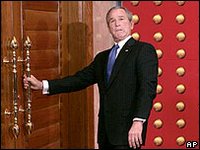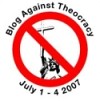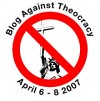Kyoto Daze Part II: Car & Driver
[click "Read on, MacDuff!" to continue reading]
You might recall some discussion of the 'feebate' option. This fee-for-guzzlers/ rebate-to-high-efficiencies seemed like it was going to gain traction, back in February...but then it was referred to committee, where it was effectively scrapped. I didn't know that it was scrapped until I saw a piece on last night's Canada Now on CBC. [the "Kyoto cars" segment-video is featured on the Canada Now website, for the time being]. In the piece, a well-intentioned Winnipeg'r weighs the purchase of a Toyota Prius against its relatively high cost. She can't quite afford it and can't wait for the long-term fuel-savings to make it affordable for her. You see, the Prius rings-in at nearly $31 000, vs. ~$23 000 for a non-hybrid car of similar size. The Canada Now correspondent tells us that Americans get a $2 000 tax incentive for purchasing such cars.
Right now, there may be some provincial incentives available to you, but they depend on where you live. For e.g., in Ontario, there is a "Tax Credit for Fuel Conservation / Tax for Fuel Conservation" but it isn't very much money. Even a highly efficient car, like a gas/electric hybrid, only guarantees a credit of $186. That said, the taxes owed for driving a highly INefficient SUV can be as high as $3200. That's seems like quite a solid disincentive. Here's the govt. website for calculating your particular vehicle's fuel consumption and and here's where you can go to figure out which incentives/rebates are available in your neck-of-the-woods (car, home, etc.). Want to see how cars stack up? Here is EnerGuide's 2005 list of the most fuel-efficient cars. Note: they're not all hybrid models!
I'm sure most of you have heard about "biodiesel." Biodiesel is a fuel derived from plants like canola and soy, i.e. completely renewable and it burns much cleaner than gas and 'normal' diesel. Now, it seems like Canada could really make a go of this, with all of our canola fields. So what's holding us back? Well, here's one problem:
Most of Canada's exportable canola supplies are purchased by Japan. The remainder of the crop is crushed for domestic consumption or export, primarily to the United States. Biodiesel production in Canada would require displacement from higher priced food uses.But Europe's managed to expand its use of biodiesel. Even the US is forging ahead, using biodiesel in an increasing number of city bus fleets. This, despite the awesome lobbying power of its petroleum industry! And no, in case you're wondering, your car wouldn't necessarily smell of french-fries :) That would drive me nuts. [Kind of like that time our family's dog got a bit of turkey-drippings on his head (he was hovering too close to my mother while she was transplanting the turkey from the roaster to the serving-dish). As much as we tried to wash the grease off of his fur, he was tormented by phantom turkey smells for days!]
I just learned the difference between "biodiesel" and using "straight vegetable oil" today:
SVO is just that - nothing but pure vegetable oil. The term "biodiesel" usually refers to alkyl ester (usually methyl ester). These esters are derived from vegetable oil. The sticky glycerine (glycerol) component of the original triglyceride (vegetable oil) is replaced with another alcohol component via the process known as transesterification. [the alcohol component is either methanol or ethanol] [...] Biodiesel making requires these chemicals, their mixture, to make a catalyst, safe heat sources, a mixer/processor of some sort, and finding some way to use the glycerol (approx. 15% glycerol is obtained from each batch). [...] SVO use, by contrast to biodiesel, requires a heated fuel system, and most often a second fuel tank and filter, to be able to start the engine, move the SVO from tank, through fuel lines, filter, injection pump and injectors, as well as to accomplish the best atomization within the engine (lowest emissions, and least likely to cause harm to the engine).One problem for non-truck drivers is finding a diesel-capable car. From what I can gather, only Volkswagen & Mercedes manufacture passenger cars that can be modified for SVO or biodiesel. Still, can you imagine how much better it would be to have our city buses and trucks running on biodiesel? Downtown T.O. would smell a whole lot sweeter. Have you heard of any plans to re-fit buses in your city? I'd love to hear about it, so please leave a comment and I'll list them in a future post. Next up: Kyoto Daze Part III: A Mighty Wind.
Read on, MacDuff!






































